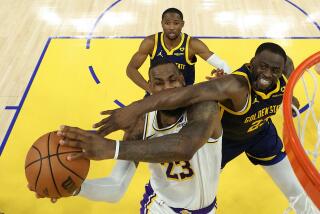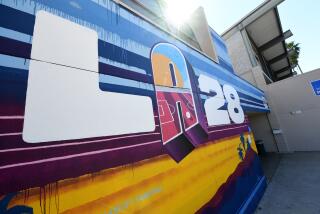Goodwill Games Get Another Try in ’94 : Sponsorship: Board of Turner Broadcasting votes to remain primary backer despite $70 million in losses in first two Games.
- Share via
Despite $70 million in losses since 1986 and little evidence of enthusiasm from television audiences, the Turner Broadcasting System, Inc. board of directors demonstrated renewed confidence Wednesday in Chairman Ted Turner’s vision of the Goodwill Games as an important and potentially profitable international, multisport competition.
At a regularly scheduled meeting in New York, the 13-member board of directors unanimously approved Turner’s plan for TBS to remain the event’s primary sponsor and broadcaster through Goodwill Games III, scheduled for 1994 in Moscow and Leningrad.
Although the board did not make a specific commitment beyond 1994, Goodwill Games President Jack Kelly said six cities in the United States and Canada have expressed interest in organizing the 1998 Games and that a site could be selected by 1992.
“There was no sense of (this commitment) being just 1994, or just ’94 and ‘98,” Kelly said. “We’re looking ahead to the future . . . ’94 and ’98 and on to 2002.”
The outcome of the vote might have been different if the board had looked only to the past. After losing $26 million on the first Goodwill Games in 1986 in Moscow, TBS lost $44 million on the second Goodwill Games last summer in Seattle. Television ratings both times were disappointing.
But Kelly said the new plan outlined a more promising financial future.
“With this business plan, it would be very, very difficult to lose $44 million,” he said. “Even in the worst case, the loss would be a long way from $44 million. There are some resources in the areas of sponsorship and advertising that haven’t been tapped into. By 1998, I think we’ll have a break-even or profit opportunity.”
TBS also expects to recover a portion of its investment by selling television rights to a major network. Kelly said negotiations are almost complete that would allow ABC to televise 15 to 18 hours of events on Saturday and Sunday afternoons for three weekends during the 1994 Goodwill Games. TBS would continue to provide the remaining 80 to 90 hours of coverage, most of it in prime time.
“That’s the best opportunity for us to get the broadest exposure with the best financial agreement,” Kelly said of the proposed ABC deal. “It’s not a major, major portion of our total income, but it’s important to us because it gives us maximum exposure to the public. It will give people who don’t have cable television an opportunity to watch the Goodwill Games.”
The involvement of ABC might also give the Goodwill Games more credibility. The event has not gained wide acceptance as a legitimate competition despite the presence of numerous world-class performers and performances. Critics have contended that the Games serve little purpose other than to provide programming for TBS and publicity for Turner.
Turner, the event’s founder, attended the board meeting but allowed Kelly and Terrence McGuirk, president of TBS Sports, to make the presentation.
“We all know what his feelings are,” Kelly said. “We look at this being a very, very major property. This is going to be something of real value.”
Even if the TBS board of directors had voted to end its involvement, Soviet sports and television officials have said they were confident they could find another major sponsor to aid them in organizing the 1994 Goodwill Games. They reportedly had contact with at least one U.S. company that packages sporting events for cable television.
Kelly said the format for the 1994 Games will be about the same as it was in Seattle.
More to Read
Go beyond the scoreboard
Get the latest on L.A.'s teams in the daily Sports Report newsletter.
You may occasionally receive promotional content from the Los Angeles Times.










